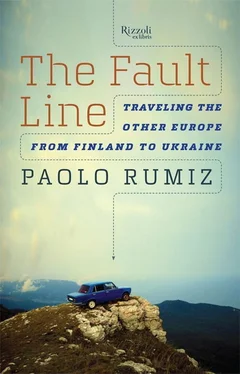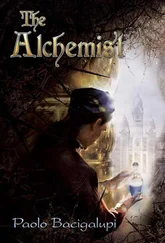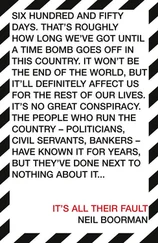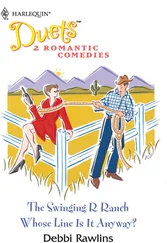At the time of Rust’s memorable exploit, an infinite number of things were prohibited in Red Square. There was not one Moscow guidebook that didn’t contain a list of that ocean of prohibitions. No running, no smoking, no singing, no disrespectful dress. But nowhere was it written “no landing.” So the German landed his plane and provoked an uproar without violating a single rule. At this border crossing, also infested with restrictions, there is no sign prohibiting the display of a fish on entering. So I try it.
I know perfectly well that the soldiers might feel I’m making fun of them. With a simple nod of the head, they could make me destroy my food reserve, and they would be totally in the right. Western border guards make the poor travelers from the East throw all the food that arrives from that direction, considered impure or contaminating, right into the garbage. In doing so, they commit an act of sacrilege against creation that will certainly have evil consequences for this opulent Europe, an act that deserves any kind of retaliation imaginable. But this time the Russians are dumbfounded, almost respectful. Standing before them is a sixty-year-old man with a business visa and a dried cod. Nothing in their rules and regulations contemplates anything like this.
There were six of us who got off the bus. Five have already gone through the passport check and had their baggage opened. I’m the last. I walk through a tunnel with an endless number of incomprehensible prohibitions posted on the walls and mirrors above and below. At the end of it, a young soldier scrutinizes my passport for ten, fifteen, twenty minutes, without asking me a thing. There’s no use in my asking questions; in Russia the fewer questions you ask, the better.
For twenty minutes, all I can see is the top of his big Soviet-style fur cap. Then comes the stamp. I move on and put my backpack on the luggage bench at Customs, but the man in uniform gives me a cheerful wave of the hand and says, “ khorosho ,” OK.
I’ve made it through. Incredibly, I’ve made it through with my fish as my pilot. I’ve made it through all the controls, just like Rust’s Piper Cub flying over the Kremlin. Who knows, maybe the Russians have somehow intuited the symbolic power of that beast on a line. For the first Christians, it was an icon, the savior fish that, according to an Eastern belief, piloted the ark in the Deluge. For the Jews, it is a sign of fertility, the jiggling gelatin of the Sabbath, the refuge food of the poor in this world of rivers that extends as far as the Bering Strait. Fish, multiplied by Christ like the loaves, an essential food for monks and ascetics. My real passport was that fish.
I change a €500 note, which is scrutinized by three different anticounterfeit machines, then we’re back on our way. On the bus, two Norwegians with enormous Yukon-style fishing backpacks, a mountain of brand-new equipment with the labels still attached. They’re going salmon fishing, and they’re meeting a friend in Murmansk who’s going to take them to the top of the world in his SUV. Their names are Rolf and Knut, and they look with dismay at my minimal bag.
There’s also a taciturn Russian girl awash in a sea of melancholy, and a young man, also mute, wearing a tie and jacket and carrying a briefcase. The bus has tinted windows, like a hearse, and a driver who never says a word, only hand gestures. That’s fine with me; we Italians are expert hand readers, but the Norwegians don’t understand and are frozen in their seats.
It should be over but it isn’t. There are still more checks. Here Putin has no buffer states between him and fortress Europe, and the border is still the border of 1945, packed with soldiers, notwithstanding the rosy predictions of the secretariat of the Euro-Arctic region of Barents. I can confirm that in the last few years crossing the border has gotten even more complicated. Thanks to the cellular phone networks, my movements now are more accurately monitored than during the Soviet era. After the pillbox at the border, a second gate opens with the inscription ROSSIYSKAYA FEDERATSIYA, and the bus drives along the shoreline of the Pasvik River that flows down from Lake Inari in Finland.
Between us and the water, a barbed-wire stockade. Finally, here it is: the old-fashioned frontier I was hoping for.
Beyond the militarized zone, another checkpoint. We get through this time, too. My fish has become our mascot, and it pilots us along a muddy road amid the anemic birch trees of the North. The only annoyance is when I try to write: the road is so full of potholes that my trembling notebooks will hold no more than six or seven slanted lines per page. Meanwhile, off in the distance, a trinity of smokestacks has appeared. It’s Nikel, unmistakable, the city consecrated by Stalin to that single divine mineral. When Mussolini founded cities named for minerals, he at least added an inflection: carbon became Carbonia. Here in the Arctic, it’s as though Mendeleev’s periodic table of the elements had assumed totalitarian powers over the human population. Nikel is an ecological disaster. It is introduced by mountains of detritus and limbless, maimed trees, the tundra seemingly laid waste by enormous flamethrowers; apartment buildings ring the factories, and then horrifying cemeteries engulfed by dead trees, the gravestones enclosed by fences with little blue gates, surreal, one for each grave. The only human presence outside of the inferno is there in the cemetery, a crowd of little men bent over their loved ones sacrificed to the god of chemistry. Faces of Uzbeks, Mongols, Caucasians. A creeping deportation that continues even after the years of the Kolyma Gulags.
To the east, strange flat-topped hills like a cordillera or a tidal wave: heaps of detritus that occlude the horizon. At their feet, another socialist industrial city, Zapolyarny. Then, once again, nothing. We aren’t allowed to stop, no pictures, no questions. We just keep bouncing along like crazy. Even sitting down you have to grab onto the handles to keep from falling out of your seat. On the sides of the road, which runs atop an embankment, carcasses of old cars devoured by rust.
“Vodka,” the driver says, pointing at them. What else, other than alcohol, can make you drive off the road in this desert of desperation? Here nobody bothers to remove old broken-down stuff. The tundra is crisscrossed with rows of crooked or ruinously fallen light poles.
This piling up of old stuff is not typical just of Barents. Even in Point Barrow, the northernmost town in Alaska and the United States, I have seen an immense open-air junkyard. Everything imaginable was on the roadside: whale skeletons, tail fins piled up next to old tires, oil barrels and wooden sleds bent out of shape by the cold; leviathan beaks, heavy as lead, next to jeeps with four flat tires; gigantic jawbones and rib cages, as big as two adult men, abandoned out in the open among rusted mufflers and snowmobile remains. Enormous bones of tail fins or rear paws lay covered with dust in courtyards among muskrats and frenetic lemmings—the latter being a sort of short-tailed, red-coated squirrel, scurrying over your feet like lightning.
Antler-headed caribou, hung out in the wind and rain to age, stared at me with their lifeless eyes surrounded by the ribs of junked boats; and then piles of wolf pelts, meat hanging on hooks to season on rooftops next to parabolic antennae; next to the front door, a pile of freshly skinned shinbones from who knows what animal. Not to mention fantastic tree roots, ripped out of the ground by a storm and carried there by the currents of the Pacific. Those tree limbs, contorted like Mediterranean olive trees, were the only things made of wood in that barren land —roots that might have come from Honolulu, Patagonia, California, or China. In the middle of all that wind and abandonment, not a living soul. Except for yours truly, who obstinately walked those deserted roads despite the bulletins announcing the presence of polar bears in the vicinity of the village.
Читать дальше












